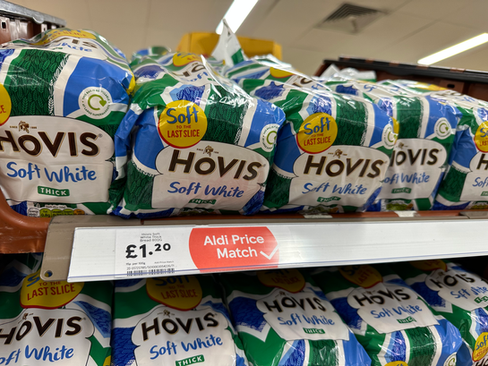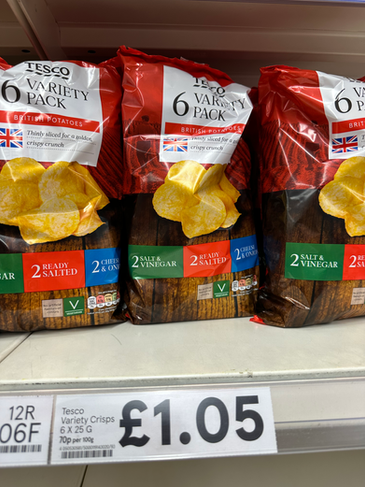Is Time Up For The Meal Deal?
- Oct 25, 2022
- 6 min read

Tesco has announced that their meal deal has been increased in price, another victim of the ever-surging costs of ingredients, manufacturing and transportation.
The popular offer, which allows shoppers to grab a sandwich, snack and drink, has risen from £3.50 to £3.90 for customers without a Clubcard and has increased from £3 to £3.40 for the 70% of customers who do have a Clubcard.
It's the second time this year that Tesco has had to increase the cost of its Meal Deal, having raised the price in February (although the Clubcard price stayed at £3) to £3.50.
Tesco isn't alone in increasing the cost of its meal deal; Boots also increased the pricing of their Meal Deal earlier in the month.
The Tesco Meal Deal still offers good value for money, especially if you select the most expensive items from the Meal Deal offerings, with some sandwiches costing £2.80 to buy separately, so paying an extra 60p for a drink and a snack does seem like good value, and as many snacks cost from around 80p to £1.20 and drinks costing from £1 to £2, picking wisely can increase the added value for your money. Still, if you can make your own lunch, it goes without saying that it will work out better for your bank balance.
Many workers admit buying a meal deal daily, as it's easier than bringing in lunch to work, but it's worth noting that 5 meal deals a week will now cost £17 a week, which is £68 a month or £816 a year, so stocking up on sandwich ingredients and cheap snacks and drinks will work out cheaper. Maybe consider bringing in your lunch Monday to Wednesday and having a meal deal Thursday and Friday (You may have used up your lunch ingredients by Thursday!); that would bring your meal deal costs to £6.80 a week, £27.20 a month and £326.40 a year, which is nearly a £500 saving!
Maybe It's Time To Ditch The Meal Deal?
The never-ending price increases for households means that many people are now cutting back on everything, and so is now is the time to drop the Meal Deal altogether, and bring your own lunch to work, faff or not, it could save you a fortune!?
Those looking to buy their own ingredients for lunches should certainly look at purchasing supermarket own-brand products rather than buying a big brand (unless it's on a promotion), own brand bread, as an example, can be some 80p cheaper than big brands, crisps are around 70p cheaper for a multi-pack, getting an own brand, and buying multipacks of drinks can keep costs low.
Pre-packaged meats can work out expensive unless you go budget branded, but you may find the quality lower. It's often better to buy a cheap cut of meat such as gammon, chicken, etc., and cook that for sandwiches instead.
I've often cooked meat, portioned it into sandwich-size portions, and frozen it, taking it out the night before I need it to defrost. This means you have a higher quality meat filler for your sandwich at a far smaller percentage of the cost of pre-sliced meats, and if you cook a few different types of meat, you can vary what you have from day to day; after all, its a bit boring having the same lunch every day!
Look at the price differences below as an example of the cost of buying a joint of meat rather than buying pre-cooked and sliced meat.
Take the gammon joint, which costs £3.40 per kilo; buying a pack of the Tesco wafer thinly sliced ham will cost you the equivalent of £10.80 per kilo, and this is a reformed product, meaning it's not necessarily the meat of one animal, this is a collection of pieces of meat that have been combined, pressed and then cooked and sliced, and will be of a lower quality of then the joint of gammon. Buying the joint would save you £7.40 per kilo.
Obviously, you need to cook the gammon, so there will be additional energy costs. Still, you can keep cooking costs low by cooking this at the same time as something else in the oven or by using a slow cooker (which is ideal for this type of meat, or other cheaper joints, which benefit from a low and slow cooking technique), it will help to keep the cooking costs low.
You would also lose a percentage of the meat through the cooking process and wastage, so let's say you lose 50% of the joint (which is a big over-estimation!); you still are paying the equivalent of £6.80 per kilo, which is £4.20 a kilo cheaper than the ready cooked product.
If you have used a slow cooker to cook the joint, the cooking water can be used as a stock to make a delicious soup, making the price even sharper, as that soup could be feeding you lunches for days, or can be frozen for use at a later date, and also as it's a great way to use up any veg in the fridge which isn't at its best, it's an excellent way to avoid waste as well!
Use leftovers to lower your lunch cost, or again freeze any meats for later use in sandwiches; whizz any leftover veggies with a stock cube, dissolved in hot water and blended, then heat through for 5 minutes or so for a quick and super cheap soup.
Keep bread fresh longer by freezing it. Take out what you need the night before, and that way, the next morning, the bread is nice and soft; and this can be done with rolls, other types of bread products, even wraps. This saves any wastage, as you're not throwing away tired-looking bread, or worse still, mouldy bread! It works just as well for yellow sticker bread if you freeze it straight away, and it costs far less!
Did you know you can freeze sandwiches? Yes, indeed, as long as you don't put veggies in the sandwich (you won't enjoy defrosted lettuce etc., as it goes slimy), you can certainly freeze them! I've done this many times with cheese and meat (nothing with mayo!), I've made a batch of sandwiches and rolls on a Sunday, frozen them and then just taken them from the freezer in the morning and by the time you are ready to eat lunch, they are defrosted and ready to go! If you want to add salad, mayo, relish etc., take them out of the freezer the night before and then in the morning add the extras, it takes far less time than making sandwiches from scratch in the morning, so enjoy those extra few minutes in bed. Bulk-freezing your lunches also means less waste, as you can use all your ingredients at once and have nothing sitting around to go bad, dry out, or be forgotten. Everything stays fresh and is super convenient!
Butter is crazy prices these days, nearly £10 for a big tub of my favourite butter; it will last a while, of course, but maybe add a smear of mayo instead of butter to your sarnie; it keeps the bread moist and tastes good, so why pay for butter if you don't need it? If you can't live without butter, go for a supermarket's own brand instead, it could be half the price of a big brand!
Cheese is indeed a friend to many a sandwich lover, but again it's expensive. Most supermarkets have their own brand, which will often be much cheaper than the big brand cheese manufacturers and may even be the same product inside the bag! Avoid grated or pre-sliced cheese because it's more expensive than buying a block. Like the meat, look at the cost per kilo of the cheese you are looking to buy. It's easy to think something is good value because it's cheaper than similar items on the shelf. By checking the weight of what you are buying and the price per kilo, you can then work out which cheaper is the best value.
The benefit of cheese over the meat is that no cooking is needed, so there are no additional energy costs or waste to worry about.
Look at the prices of different variants of the same Tesco mature cheese. This is the same product; however, one pack is a block, one is grated, and one is sliced:
The block costs £7.50 per kilo, and both the grated and sliced cost £10.00 per kilo, meaning you would save £2.50 per kilo by buying the blocks and granting or slicing it yourself, that's a 25% saving; also, the grated version contains potato starch, (to stop the cheese sticking together), so you are getting even less cheese by buying grated!
Nobody really likes to make a packed lunch, its boring to do and wastes time, but it really will save you a good few quid, perhaps the savings can be put towards a monthly lunch in a restaurant or pub, with your colleagues or friends, as an end of month treat as your reward for being more frugal with your lunches!
























